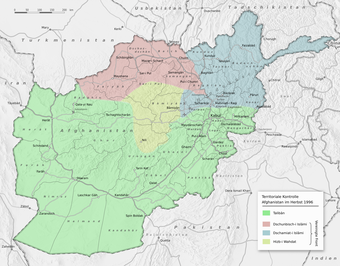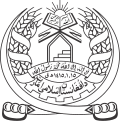Islamic emirate of Afghanistan
|
Because Afghanistan Islami Amarat (Pashtun)د افغانستان اسلامي امارت Islamic Emirate Afghanistan 1996 / 1997-2001 Since 2021 |
|||||
|
|||||
|
Motto : لا إله إلا الله محمد رسول الله Laa ilaha illa llāh Muhammadun rasūlu llāh. ( Arabic for "There is no god but Allah and Mohammed is the Messenger of God.", see Schahāda ) |
|||||
| Official language |
Pashtun (officially) Persian |
||||
| capital city |
Kabul (de jure) Kandahar (de facto) |
||||
| Form of government | Islamic emirate | ||||
| Form of rule | theocracy | ||||
| Head of State ( Amīr al-Muʾminīn ) |
Mohammed Omar (1996-2001) Hibatullah Achundsada (since 2016) |
||||
| Head of government |
Mohammed Hassan Achund (interim government, 2021) Abdul Kabir (2001) Mohammad Rabbani (1996–2001) |
||||
| area | 647,500 km² | ||||
| currency | Afghani | ||||
| founding | September 27, 1996 (invasion of Kabul) | ||||
| interim resolution | December 17, 2001 ( Battle of Tora Bora ) | ||||
| renewed proclamation | August 19, 2021 | ||||
| National anthem | no | ||||
| Time zone | UTC +4.5 (March to October) | ||||
| License Plate | AFG | ||||
| Phone code | +93 | ||||
| map | |||||
|---|---|---|---|---|---|

|
|||||
The Islamic Emirate of Afghanistan ( Pashtun د افغانستان اسلامي امارت) is an internationally not generally recognized Islamic emirate that was proclaimed by the Taliban and ruled Afghanistan between 1997 and 2001 and again since August 2021 .
It was formally for the first time in October 1997, during the Afghan civil war , by the then government talibanische proclaimed and insisted in Afghanistan de facto until the arrival of international troops since the 2001 troop withdrawal in mid 2021 it checked again throughout Afghanistan.
story
1996-2001
The Taliban had ruled most of Afghanistan since September 1996. In October 1997 they formalized the position of Mohammed Omar as his head of state by officially proclaiming Afghanistan as an “ emirate ”. Omar had already been awarded the title Amir al-Muʾminin (Leader of the Faithful) by the Taliban's leadership group in April of the previous year , which made him the emir of Afghanistan. Even after the state they led was renamed, the Taliban only maintained official diplomatic relations with Saudi Arabia , Pakistan and the United Arab Emirates .
After its establishment, the emirate controlled about 85 percent of the national territory, except for the extreme northeast. However, the emirate turned significant parts of the population against itself with the abolition of freedoms and human rights: Women's rights under the Taliban deprived women of any possibility of a free, self-determined life. Cinema and light music were strictly forbidden for men and women. Children who played were partially punished.
In 1998 the Taliban had drawn up a rough constitution in which the Amir al-Mu'minin , similar to the Supreme Leader in Iran , is the absolute head of state and appoints an “Islamic Council” to act as government. The draft did not provide for a separation of powers , human rights or democratic elections. However, this constitution was never adopted. In the meantime, the Taliban have made hints that the previous Afghan constitution should formally continue to apply, since its goals are essentially religious, not political-structural in nature.
The emirate de facto dissolved on December 17, 2001 after it was overthrown by the Northern Alliance and its allies under US leadership as part of Operation Enduring Freedom .
2021
With the end of Resolute Support , the US and NATO allies withdrew from Afghanistan. During the withdrawal, the Taliban brought almost all of Afghanistan under their control in the summer of 2021 , without encountering any significant resistance from the Afghan national army . After they had also captured Kabul and the Afghan President Ashraf Ghani left the country and admitted the military defeat, the Taliban declared the Islamic emirate again.
In a first press conference after they came to power, the Taliban announced a general amnesty in Kabul, which would also apply to soldiers of the Afghan national army and other collaborators of the former occupation forces ( e.g. local staff or translators).
In several Afghan cities, residents demonstrated against the Taliban and their proclaimed Islamic emirate in August and September 2021. On September 8, 2021, the interim government issued its first official statement to ban demonstrations.
politics
Transitional government 2021
Mohammed Hassan Achund was introduced on September 7, 2021 by Taliban leader (and thus de-facto head of state) Hibatullah Achundsada as head of government of a transitional government of the Islamic emirate of Afghanistan. Other important members of the cabinet are:
- Abdul Ghani Baradar as Deputy Prime Minister
- Sarajuddin Haqqani as Minister of the Interior
- Amir Khan Muttaqi as Foreign Minister
- Mullah Yaqoob as Minister of Defense
- Zabiullah Mujahid as government spokesman .
The transitional government has a total of 33 members, all of whom are Taliban except for one Pashtun . Women are not represented in the cabinet: The Taliban, according to their own statements, consider them “unsuitable” to work in higher positions. The Ministry of Women also appears to have been abolished.
Women's rights
In a first press conference in August 2021, the Taliban stated that women should be part of society under the Islamic Sharia . Women are likely to work in health, education and “other fields”. However, a few days after this announcement, the Taliban banned a prominent TV presenter from working. Women who previously worked as judges in the Islamic Republic of Afghanistan are viewed as infidels according to the Sharia interpretation of the Taliban . They were successfully assassinated during the war .
In September 2021, the Taliban made niqab compulsory for women at universities. Furthermore, women who want to study are taught in rooms and buildings separated from men. If a spatial separation is not possible, both sexes should be separated by curtains stretched into the rooms.
media
There is no freedom of the media in the Taliban-ruled regions of the country . When the Taliban came to power again in 2021, TV music programs could no longer be received, at least in the capital Kabul. Programs with women have also only been available to a limited extent in Kabul since mid-August 2021. Turkish series that were criticized by conservative Afghans as inconsistent with Afghan values even before the Taliban took over have been removed from the broadcasters' programs. According to a statement by the Taliban in August 2021, the content broadcast by the media in the Islamic emirate of Afghanistan should conflict with non-Islamic values and the media itself should remain impartial.
literature
- Ahmed Rashid : Taliban. Afghan warriors of God and jihad. Droemer, Munich 2001, ISBN 3-426-27260-1 .
Individual evidence
- ↑ Afghanistan: Mohammed Hassan Achund becomes head of the Taliban government. In: Der Spiegel. Retrieved September 7, 2021 .
- ↑ a b Taliban announce creation of Islamic Emirates of Afghanistan. August 19, 2021, accessed August 19, 2021 .
- ↑ Martin Ewans: Afghanistan. A New History. 2nd edition. Routledge Shorton, London et al. 2002, ISBN 0-415-29826-1 , p. 196.
- ↑ Ahmed Rashid: Taliban. Militant Islam, Oil and Fundamentalism in Central Asia. Yale University Press, New Haven CT et al. 2001, ISBN 0-300-08902-3 , pp. 42-43 (English).
- ↑ Uwe Klußmann: History of Afghanistan: How did the Taliban get so powerful? In: Der Spiegel. Retrieved August 20, 2021 . (behind paywall )
- ^ Taliban Constitution Offers Glimpse Into Militant Group's Vision For Afghanistan. Accessed September 1, 2021 .
- ↑ Borhan Osman and Anand Gopal: TALIBAN VIEWS ON A FUTURE STATE . Ed .: NYU. ( nyu.edu [PDF]).
- Jump up ↑ Afghanistan - Ghani admits defeat against Taliban. In: deutschlandfunk.de. May 18, 2021, accessed August 15, 2021 .
- ↑ a b Taliban spokesman declares the war over - news update. In: Der Spiegel. August 16, 2021, accessed August 15, 2021 .
- ↑ a b c Afghanistan News-Update: The first evacuees arrive in Germany. In: Der Spiegel. Retrieved August 17, 2021 .
- ↑ nytimes.com: https://www.nytimes.com/live/2021/08/19/world/taliban-afghanistan-news , accessed on August 19, 2021.
- ↑ Janita Hämäläinen, Christoph Reuter: Afghanistan: Demonstration in Kabul - "Nobody knows what will happen next". In: Der Spiegel. Retrieved September 7, 2021 .
- ↑ Anti-Taliban protests now also in Kabul: https://orf.at/stories/3225465/ , accessed on August 19, 2021.
- ↑ deutschlandfunk.de: https://www.deutschlandfunk.de/afghanistan-proteste-gegen-die-taliban-am.2932.de.html?drn:news_id=1292561 , accessed on August 19, 2021.
- ↑ Taliban prohibit all protests in Afghanistan. In: Der Spiegel. Retrieved September 8, 2021 .
- ↑ Afghanistan: Mohammed Hassan Achund becomes head of the Taliban government. In: Der Spiegel. Retrieved September 7, 2021 .
- ↑ AFP | Reuters: Taliban appoint Mohammad Hasan Akhund as leader of 'acting' govt. September 7, 2021, accessed September 7, 2021 .
- ↑ Former Gitmo Inmates and Wanted Terrorists: Meet the New Taliban government. In: Vice.com. Retrieved September 8, 2021 .
- ↑ Taliban: How the world reacts to the new rulers in Afghanistan. In: Der Spiegel. Retrieved September 8, 2021 .
- ^ A Future Afghan Govt 'Not Complete' Without Women: Koofi . In: TOLOnews , August 24, 2021. Accessed August 28, 2021.
- ^ Taliban announce new government for Afghanistan . In: BBC News , September 7, 2021.
- ↑ Afghanistan News-Update: Taliban forbid prominent TV presenter to work. In: Der Spiegel . August 19, 2021, accessed August 19, 2021 .
- ↑ Dietmar Pieper: Afghanistan: Threats against female judges - "We'll get you". In: Der Spiegel. Retrieved August 25, 2021 .
- ↑ Afghanistan: Taliban issue Nikab compulsory for women at universities. In: Der Spiegel. Retrieved September 5, 2021 .
- ↑ Mirror: Taliban issued niqab obligatory for women at universities. Retrieved September 8, 2021 .

